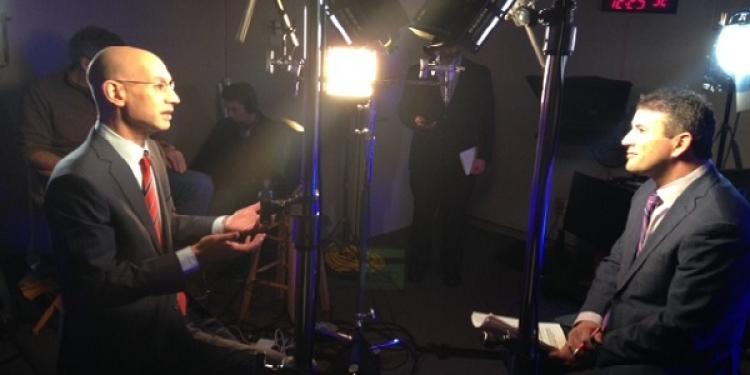Adam Silver’s Stance on Sports Betting (part2)
Posted: May 14, 2015
Updated: May 14, 2015

More about Adam Silver and his realizations on legalized gambling.
As the only sports commissioner in American professional sports to openly support legalized sports betting, NBA Commissioner Adam Silver sees himself more “pro-realist” than “pro-gambling.” But it seems as though his words are defining how others view him. Now anywhere he appears, people will refer to him as “that pro-gambling guy.” Silver didn’t quite expect for his words to have such an effect.
• Adam Silver sees himself more “pro-realist” than “pro-gambling.”
• Silver also believes legalizing sports betting should dealt with federally first.
• USD 138 billion was wagered illegally on basketball.
Silver recently interviewed with ESPN in order to bring some clarification on his stance concerning legalized sports betting. Having worked under former NBA commissioner Stern in five different positions, Silver gained a firm understanding of “pro-regulation” while working building the NBA franchise overseas. Witnessing other countries that allowed sports betting, Silver opened his eyes to the reality taking over the World.
Silver gives stance while stopping New Jersey from legalized gambling
Silver’s efforts to drum up support for his crusade isn’t “a cake walk” nor “chasing windmills”, but somewhere in between. Prior to his announcement of his stance, the NBA announced a major deal with FanDuel, the fantasy sports operator. The daily operator, that made $621 million last year, agreed to give the NBA equity stake in the company. Although fantasy sports isn’t considered legal betting it does fall in the range.
Chris Christie, governor of New Jersey, have repeatedly made efforts to bring legalized gambling to his “cash strapped” state. This addition could offset the declining gambling industry in Atlantic City which has resulted from the recession and other gambling options available to people. Having just stated the case for legalized gambling orally to the circuit court of appeals, a decision will be made in June.

Silver and league representatives were taking a stand against Christie’s goals of gambling regulation in New Jersey. Silver’s stance on pro-regulation is foremost in his mind. He’s smart to use the word “pro-regulation because it connotes a more official or law oriented direction to take with gambling. “I felt the need to explain why I had made other statements acknowledging that I thought sports betting should be legalized.”
Silver fears that legalized gambling in New Jersey will create so many individual channels that regulation will be even harder to maintain. “In light of these domestic and global trends, the US laws on sports betting should be changed. Congress should adopt a federal framework that allows states to authorize betting on professional sports, subject to strict regulatory requirements and technological safeguards.”
Others join in the shadows as Silver speaks out in the forefront.

Christie based his directive to legalize sports betting in New Jersey on a loophole found in the Department of Justice’s language concerning violations to PASPA. Silver also believes that legalizing sports betting should be deliberated on the federal level first, then the state. He and the NBA weren’t the only ones in an effort to create a possible roadmap or plan of action.
In 2012, the National Football League (NFL), National Collegiate Athletic Association (NCAA) and the International Olympic Committee met to discuss the gambling industry. Included were talks with law enforcement officials, gaming regulators, addiction specialists and student-athletes involved in sports gambling. Other “secret” discussions took place about contingency plans for when sports betting becomes legal.
Silver said he had support from other organizations and all the leagues given people the specific tasks of studying sports betting. USD 138 billion was wagered illegally on basketball, while a mere USD 1 billion was wagered illegally. Dallas Mavericks’ owner Mark Cuban said “we did everything possible to encourage it while publicly condemning gambling. I’m glad Adam is putting the hypocrisy behind us and putting it all up front.”
On very feasible suggestion by Cuban was for leagues to charge sportsbooks and casinos licensing fees in exchange for use of the league’s data. Another option could be for land-based and online sportsbooks to pay leagues in accordance to the earnings made from wagers of games.
The options considered should benefit the entire league and not just owners and commissioners.












